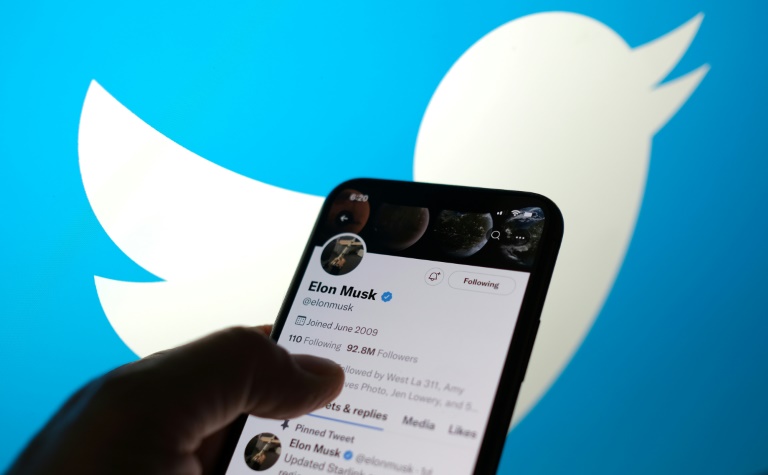SOCIAL
‘Stamp of approval’: Twitter’s Musk amplifies misinformation

An AFP analysis of Elon Musk’s tweets shows the Twitter boss amplifying misinformation about everything from Covid-19 to the war in Ukraine
– Copyright AFP Chris Delmas
Bill MCCARTHY
Elon Musk promised to make Twitter the “most accurate source of information about the world,” but he has repeatedly used his own account to amplify false claims from some of the most notorious disinformers on the internet, according to an AFP analysis of his online activity.
The posts show Musk drawing attention to misinformation about everything from the war in Ukraine to the attack on US Congresswoman Nancy Pelosi’s husband. Last week, the billionaire boosted a tweet that wrongly suggested doctors misdiagnosed flu cases as Covid-19 deaths.
“One of the greatest mysteries of Covid-19: Where did the flu go in 2020 and 2021?” an account called “KanekoaTheGreat” said, to which Musk replied: “Good question.”
It was one of at least 40 times the billionaire replied to the profile, which has promoted the QAnon conspiracy theory, since purchasing Twitter for $44 billion nearly six months ago. He has only replied to a handful of accounts more in that time.
Using data from PolitiTweet, a website that tracked public figures’ posts until Twitter cut off its access, AFP reviewed thousands of replies Musk published between late October and March.
He shared a fabricated CNN segment, called a made-up quote “wise words” and falsely claimed police escorted a rioter through the US Capitol on January 6, 2021. He amplified a post blaming mass shootings on LGBTQ individuals and endorsed a fake casualty count from Ukraine.
Musk has also downplayed Covid-19 and promoted spurious claims about vaccines causing blood clots, miscarriages and heart problems.
“We are running out of ‘conspiracies’ that turned out to be true!” the Twitter owner said in March, replying to a tweet that listed Covid-19 and vaccine safety among the “biggest media lies.”
Days later, he tweeted that the “best way to fight misinformation is to respond with accurate information.”
Experts say Musk’s activity is concerning — and not just because of his online influence.
“Musk has almost 135 million Twitter followers and forced his engineers to increase the reach of his tweets, so we should worry when he spreads misinformation,” Brendan Nyhan, a Dartmouth College professor who studies misperceptions in politics, told AFP.
“I’m most worried, though, about what these tweets reveal about the judgment of the person who determines the policies of a major social media platform.”
– Musk’s feed –
Researchers have tied Twitter’s recent policy changes — including Musk’s reinstatement of suspended accounts and its overhaul of verification practices — to spikes in misinformation.
NewsGuard, a company that assesses websites’ credibility, found accounts paying for Twitter’s subscription service are inundating the site with false claims.
Musk is driving attention to some of these accounts.
“Got the Elon Musk stamp of approval,” said “KanekoaTheGreat” on Telegram after one such reply.
A January study from the Institute for Strategic Dialogue, a London-based think tank, recorded a “staggering” increase in Musk’s interactions with right-wing accounts since acquiring Twitter, including several profiles other research identified as spreaders of US election misinformation.
Musk has repeatedly amplified posts from sources such as the pro-Donald Trump page “Catturd,” the anti-LGBTQ account “Libs of TikTok” and the conspiratorial website ZeroHedge.
Ian Miles Cheong, a far-right blogger, has received at least 60 replies from Musk — topping all but a few other profiles, according to AFP’s analysis. In one instance, Musk amplified a tweet blaming Joe Biden for an immigration program that started under Trump.
“Musk is elevating some of the worst voices on Twitter,” Nyhan told AFP. “These interactions are likely to increase the reach and prominence of the accounts.”
In some cases, the Twitter boss has helped mainstream false narratives.
After an intruder broke into Pelosi’s California residence and struck the lawmaker’s husband with a hammer in October, Musk tweeted a link to an article claiming he was drunk and quarreling with a male prostitute. #Pelosigaylover trended on Twitter.
Court filings and footage of the incident disproved the claims, which stemmed from a site that had previously published misinformation. But the damage was done.
“It’s really sad for the country that people of that high visibility would separate themselves from the facts and the truth in such a blatant way,” Nancy Pelosi said at the time. “It is traumatizing to those affected by it. They don’t care about that, obviously.”
Twitter responded to AFP’s requests for comment with the poop emoji, an auto-reply Musk launched in March.
SOCIAL
Snapchat Explores New Messaging Retention Feature: A Game-Changer or Risky Move?

In a recent announcement, Snapchat revealed a groundbreaking update that challenges its traditional design ethos. The platform is experimenting with an option that allows users to defy the 24-hour auto-delete rule, a feature synonymous with Snapchat’s ephemeral messaging model.
The proposed change aims to introduce a “Never delete” option in messaging retention settings, aligning Snapchat more closely with conventional messaging apps. While this move may blur Snapchat’s distinctive selling point, Snap appears convinced of its necessity.
According to Snap, the decision stems from user feedback and a commitment to innovation based on user needs. The company aims to provide greater flexibility and control over conversations, catering to the preferences of its community.
Currently undergoing trials in select markets, the new feature empowers users to adjust retention settings on a conversation-by-conversation basis. Flexibility remains paramount, with participants able to modify settings within chats and receive in-chat notifications to ensure transparency.
Snapchat underscores that the default auto-delete feature will persist, reinforcing its design philosophy centered on ephemerality. However, with the app gaining traction as a primary messaging platform, the option offers users a means to preserve longer chat histories.
The update marks a pivotal moment for Snapchat, renowned for its disappearing message premise, especially popular among younger demographics. Retaining this focus has been pivotal to Snapchat’s identity, but the shift suggests a broader strategy aimed at diversifying its user base.
This strategy may appeal particularly to older demographics, potentially extending Snapchat’s relevance as users age. By emulating features of conventional messaging platforms, Snapchat seeks to enhance its appeal and broaden its reach.
Yet, the introduction of message retention poses questions about Snapchat’s uniqueness. While addressing user demands, the risk of diluting Snapchat’s distinctiveness looms large.
As Snapchat ventures into uncharted territory, the outcome of this experiment remains uncertain. Will message retention propel Snapchat to new heights, or will it compromise the platform’s uniqueness?
Only time will tell.
SOCIAL
Catering to specific audience boosts your business, says accountant turned coach

While it is tempting to try to appeal to a broad audience, the founder of alcohol-free coaching service Just the Tonic, Sandra Parker, believes the best thing you can do for your business is focus on your niche. Here’s how she did just that.
When running a business, reaching out to as many clients as possible can be tempting. But it also risks making your marketing “too generic,” warns Sandra Parker, the founder of Just The Tonic Coaching.
“From the very start of my business, I knew exactly who I could help and who I couldn’t,” Parker told My Biggest Lessons.
Parker struggled with alcohol dependence as a young professional. Today, her business targets high-achieving individuals who face challenges similar to those she had early in her career.
“I understand their frustrations, I understand their fears, and I understand their coping mechanisms and the stories they’re telling themselves,” Parker said. “Because of that, I’m able to market very effectively, to speak in a language that they understand, and am able to reach them.”Â
“I believe that it’s really important that you know exactly who your customer or your client is, and you target them, and you resist the temptation to make your marketing too generic to try and reach everyone,” she explained.
“If you speak specifically to your target clients, you will reach them, and I believe that’s the way that you’re going to be more successful.
Watch the video for more of Sandra Parker’s biggest lessons.
SOCIAL
Instagram Tests Live-Stream Games to Enhance Engagement

Instagram’s testing out some new options to help spice up your live-streams in the app, with some live broadcasters now able to select a game that they can play with viewers in-stream.
As you can see in these example screens, posted by Ahmed Ghanem, some creators now have the option to play either “This or That”, a question and answer prompt that you can share with your viewers, or “Trivia”, to generate more engagement within your IG live-streams.
That could be a simple way to spark more conversation and interaction, which could then lead into further engagement opportunities from your live audience.
Meta’s been exploring more ways to make live-streaming a bigger consideration for IG creators, with a view to live-streams potentially catching on with more users.
That includes the gradual expansion of its “Stars” live-stream donation program, giving more creators in more regions a means to accept donations from live-stream viewers, while back in December, Instagram also added some new options to make it easier to go live using third-party tools via desktop PCs.
Live streaming has been a major shift in China, where shopping live-streams, in particular, have led to massive opportunities for streaming platforms. They haven’t caught on in the same way in Western regions, but as TikTok and YouTube look to push live-stream adoption, there is still a chance that they will become a much bigger element in future.
Which is why IG is also trying to stay in touch, and add more ways for its creators to engage via streams. Live-stream games is another element within this, which could make this a better community-building, and potentially sales-driving option.
We’ve asked Instagram for more information on this test, and we’ll update this post if/when we hear back.
-

 PPC4 days ago
PPC4 days ago19 Best SEO Tools in 2024 (For Every Use Case)
-

 PPC7 days ago
PPC7 days ago4 New Google Ads Performance Max Updates: What You Need to Know
-

 MARKETING7 days ago
MARKETING7 days agoWill Google Buy HubSpot? | Content Marketing Institute
-
SEARCHENGINES6 days ago
Daily Search Forum Recap: April 16, 2024
-

 SEO6 days ago
SEO6 days agoGoogle Clarifies Vacation Rental Structured Data
-

 MARKETING6 days ago
MARKETING6 days agoStreamlining Processes for Increased Efficiency and Results
-
SEARCHENGINES5 days ago
Daily Search Forum Recap: April 17, 2024
-

 PPC7 days ago
PPC7 days agoHow to Collect & Use Customer Data the Right (& Ethical) Way













